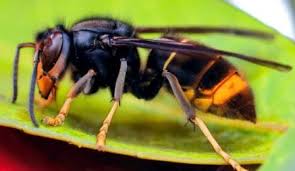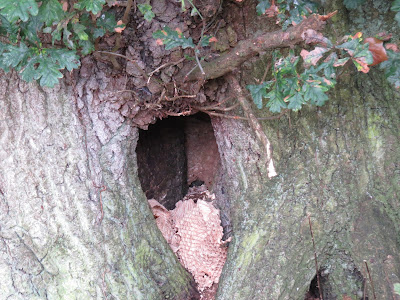Like other British beekeepers, I've been on the look out the
Asian hornet
(Vespa velutina), which is a particularly nasty alien species. Earlier in the summer, there were scare stories in the press about sightings of this 'killer hornet' in Britain, but fortunately none of these turned out to be true. A few weeks later, though, there was a confirmed sighting in the Channel Islands - and so beekeepers knew that it was just a few miles away from the British mainland.
Yesterday, it has been confirmed that the Asian hornet has been found in Tetbury, Gloucestershire.
 |
| Asian hornet |
This is bad news for honey bees and many other pollinators. European hornets kill honey bees, but these two species have evolved together. Strong honey bee colonies usually survive wasp attacks. The Asian hornet (thought to have entered France in 2004 on pottery from China) is a new and unfamiliar predator that is likely to have a terrible impact on honey bee colonies.
Asian hornets will attack honey bees as they go to and from the hive. They can kill them when the bees are returning loaded with pollen in their baskets. Then, when the colony is weakened, the hornets will enter the hive and attack the young bees. The Asian hornets can wipe out a honey bee colony very quickly.
So what can I do to protect my bees? Beekeepers have been encouraged to make special, DIY Asian hornet traps out of plastic bottles. Putting out the usual wasp trap would catch them, but in this case a trap needs to be made so that the Asian hornet can be clearly identified i.e. not the commonly used jam-jar trap that picks up lots of wasps together.
 |
| I found this European hornets' nest close to my smallholding this summer |
I generally only put out wasp traps if I think my hives are being attacked (I haven't this year because the wasps haven't been a problem here). I don't want to catch wasps for the sake of it. But now I'll have to put out a wasp trap first of all in the spring, when the Asian hornet queens are about and looking to build a nest - and then keep it out throughout the summer. If I see an Asian hornet, I'll need to notify Defra at once through the Non-Native Species Secretariat (NNSS) at alertnonnative@ceh.ac.uk (there is a link to the NNSS on the Asian hornet
here)
I'll also help to locate the nearby nest, although the advice is for the public not to destroy the nests themselves. In Gloucestershire, a three mile surveillance zone has been placed around the original sighting and the nest or nests is/are being sought and destroyed.
Obviously I hope all the early hornet nests are destroyed at once - and that this nasty visitor doesn't get the chance to survive and spread across the UK.

I was shocked when I learnt this on the news yesterday - Tetbury is literally down the road from me. I do hope that they are all caught and destroyed quickly.
ReplyDeleteI suppose one thing to think about is that this is the first sighting of the Asian hornet - it may not be the first place it has arrived in. Well done to whoever spotted it in Tetbury for alerting the authorities so that it can (hopefully) be dealt with.
DeleteBad news indeed. As if honeybees need another threat. It's distressing.
ReplyDeleteYes, it's yet another threat to our bees - all down to the actions of humans, of course
DeleteI have just been reading about this in the newspaper. How worrying it all sounds. I hope all the extra care and vigilance will stop the creatures spreading across the country:)
ReplyDeleteSo do I. I know Defra has been planning for this, but I imagine finding a hornets' nest can be a bit like finding a needle in a haystack.
DeleteIt seems to be one thing after another these days and never any good news on the wildlife front. I hope we can successfully protect our bees.
ReplyDeleteThere does seem to be a lot of bad news around for wildlife. I can see all sorts of problems with a very cold winter, but I wonder if that would kill these early hornet colonies off.
DeleteAs if our honey bees didn't have enough to contend with! Hopefully the nest will be dealt with promptly and that no more nests will be found.
ReplyDeleteI know most beekeepers are on the alert for the Asian hornet. It would be good if it was widely recognised among the general public and so any arrivals in an area are spotted at once and dealt with.
DeleteIt is very worrying news - especially as honey bees are facing so many problems. Good to see that DEFRA has plans in place and I do hope they find the nest down in Gloucestershire.
ReplyDeleteI hope it is only one nest/colony. I must admit I was expecting the first sightings to be along the south coast or close to me in East Anglia.
DeleteThis is a really interesting post Wendy, in that I'd heard the news, but didn't realise the steps beekeepers can take in the fight, by being vigilant, notifying Defra, and being ready with traps. I really hope they don't manage to take hold in the way species such as harlequin ladybirds have. As Pauline says above, our honeybees have enough to contend with!
ReplyDeleteBeekeepers have been prepared after following the damage the hornet has done in France. I know my group of local beekeepers has been discussing the different traps to put around the hives to catch them.
DeleteWorrying news, especially as our bees are under threat anyway. I do hope you can keep your bees safe.
ReplyDeleteI can only hope the traps will pick up the queens in spring if they do reach here. That will be so much easier than trying to find the nests.
DeleteI hope the intruder is stopped in its tracks and doesn't spread any further around the country!
ReplyDeleteI will be waiting anxiously to see if any queens are caught in traps in the spring. I'm not sure how far north the hornet will spread because where the weather is colder, it may not survive.
DeleteGosh that is worrying for beekeepers. As if the bees haven't enough problems already recently. Its good that everyone is being vigilant and hopefully can all help and inform each other.
ReplyDeleteI think where it is spotted there is a good system of information sharing. The worry is that is gets established before it is discovered.
DeleteHow worrying, as if the bees don't have enough problems!!!xxx
ReplyDeleteYes it's yet another threat to our bees. I imagine any wild colonies will disappear without anyone knowing.
DeleteLet's hope that it doesn't take hold. Sarah x
ReplyDeleteI hope the Gloucestershire hornets have all been eradicated now they've destroyed the nest. Now the hunt is on for the hornets' nest in Somerset.
Delete